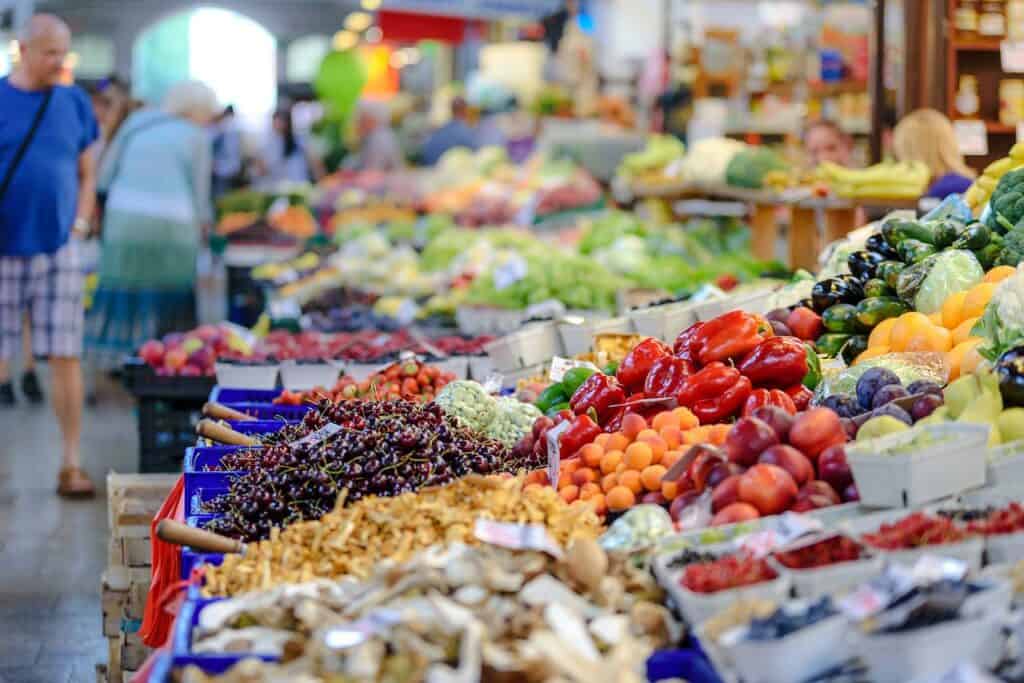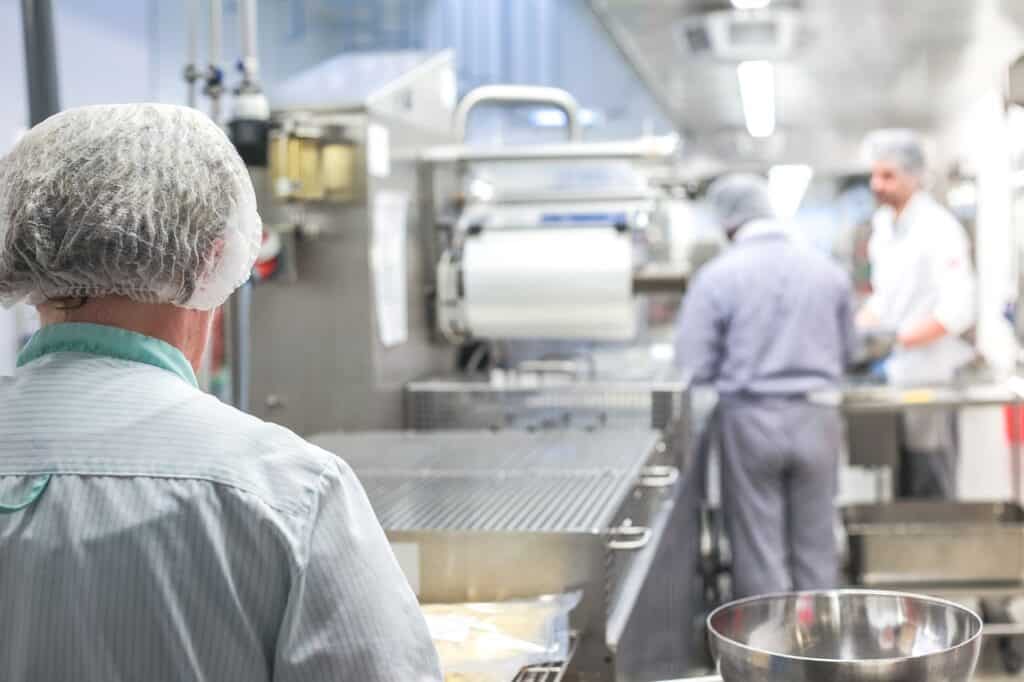Introduction – What Is Food Sustainability?
What does food sustainability mean to you? In this post, we will address the implications of sustainable food practices for restaurants, home cooking, and grocery shopping. Additionally, we will define what sustainable food practices are. In addition to that, we will discuss the most effective ways for you to select environmentally friendly foods. Separately, we’ve covered in great detail the impact of diets on carbon emissions if you want to get into nitty gritty details.

The term “food sustainability” refers to the various efforts and initiatives taken to make sure that the food we eat is produced in a way that does not damage or deplete the environment. This can encompass everything from the way the food is grown or raised, to how it is processed and distributed.
Local Production Means More Sustainable Food Than Remote Production
There are several different ways to approach food sustainability, but one of the most important things is to focus on local production. Local production itself will be relative. A farm that is in the same town is more local than one in the same state. Yet one in the same state is more local than one in a different country. By supporting local farmers and producers, we can help to reduce the carbon footprint of our food. This is because locally grown food doesn’t have to be transported long distances, which uses up a lot of energy and resources.
Another key part of food sustainability is waste reduction. In developed countries like the United States, we tend to waste a lot of food – often because it doesn’t look “perfect” or we simply don’t know how to use all of what we’ve bought. Learning how to reduce food waste can go a long way in making our food system more sustainable. We cover in another part of this website a measurement of food waste, and it turns out to be a huge problem. Each person on average wastes 242 pounds or 110 kg of food every year in the US.
Finally, keep in mind that there is no such thing as a universal definition of sustainability. It’s possible that what works for one community may not work for another. It’s important to be open to new ideas and approaches and to tailor our efforts to the specific needs and resources of our area.
This is a complex issue, but by working together we can make positive steps towards a more sustainable future.
You Might Like: What are you growing this year?
Reduced Waste Means More Sustainable Food
The term “sustainable food” is often used interchangeably with “food sustainability.” However, while they are similar, there is a slight difference between the two.
Sustainable food refers to food that is grown or raised in a way that does not damage or deplete the environment. This can include things like using sustainable farming practices, supporting local farmers, and reducing food waste.
Meanwhile, food sustainability encompasses all of those things but also includes initiatives and efforts to make sure that the food system as a whole is sustainable. This includes things like ensuring access to healthy food for all people, no matter their income level or location.
So, while sustainable food refers to the actual food itself, sustainability encompasses everything from production to distribution to access.
Another One: What’s the Greenest Car? A Short Guide to Vehicle Emissions
Sustainable Food Reduces Energy Usage And Carbon Emissions
There are several reasons why food sustainability is important. First and foremost, it’s important for the environment. The way we currently produce and consume food is not sustainable. At least not in the conventional way. The reasoning is that everyone on Earth is moving toward an “improved” state of development. And as far as we can see, that state of development means a consumption pattern of wasting 242 pounds of food a year. If we want to preserve our planet for future generations, we need to find ways to produce food that doesn’t continue to grow in energy use while producing incrementally more instead of reducing the waste we already have.
In addition, food sustainability is important for public health. The way our food is produced can have a direct impact on our health. For example, if food is grown using harmful pesticides or chemicals, those chemicals can end up in our bodies.
Finally, food sustainability is important for social justice reasons. The current food system often disadvantages marginalized groups, such as low-income people or people who live in rural areas. By working toward a more sustainable food system, we can help to level the playing field and ensure that everyone has access to healthy, affordable food.
Specific Actions To Achieve Food Sustainability

There are many ways to achieve food sustainability, but it will likely look different in different communities. Some of the most important things you can do to support food sustainability are:
- Support local farmers and producers – for example adopt a chicken
- Reduce food waste
- Educate yourself and others about the importance of food sustainability
- Advocate for policies that support food sustainability
No matter what approach you take, it is essential to keep in mind that the concept of sustainability does not come in a cookie-cutter form. What is successful in one community might not be applicable in another. It’s important to be open to new ideas and approaches and to tailor our efforts to the specific needs and resources of our area.
By working together, we can make positive steps towards a more sustainable future.
Check This Out: Recycle Waste: Why is Recycling Good For Carbon Reduction
Benefits Of Food Sustainability
There are many benefits of food sustainability, both for the environment and for human health.
Some of the direct and indirect environmental benefits include:
- Reduced pollution and contamination
- Improved water quality
- Enhanced soil health
- Increased biodiversity
Some of the human health benefits include:
- Reduced exposure to harmful chemicals and toxins
- Increased access to healthy, affordable food
- Improved mental and physical health
In addition to these direct benefits, it also has indirect benefits. For example, by working towards a more sustainable food system, we can help to create jobs and boost the economy. We can also help to improve social justice by ensuring that everyone has access to healthy, affordable food.
To be truly effective, our efforts must be tailored to the specific needs and resources of each community.
Related Article: Shifting To a Green Office Supply – What to Swap Out and Where to Get It
Sustainable Food Organizations
There is a multitude of groups across the globe that are putting in the effort to advance the cause of food sustainability. This is a selection of the very best.
FoodTank
FoodTank is a non-profit research organization that works for the elimination of hunger, obesity, and poverty by promoting reform of the food system through the dissemination of information, the promotion of causes, and the establishment of networks.
Sustainable Food Trust
The mission of Sustainable Food Trust is to impact and improve the work being done by other organizations by focusing on leadership and advocacy, research and policy, as well as communications.
International Food Policy Research Institute
More than 600 people are employed by the International Food Policy Research Institute across more than 50 countries. These individuals are working to develop and implement sustainable policy solutions that would alleviate poverty, put an end to hunger, and improve nutrition in developing nations.
Conclusion
There is no single answer to the question of how to achieve food sustainability. It’s a complex issue with many different facets, and there is no easy fix. However, by working together and educating ourselves about the importance of food sustainability, we can make progress. We can start by supporting local farmers and producers, reducing food waste, and advocating for policies that support food sustainability. Together, we can make a difference.
